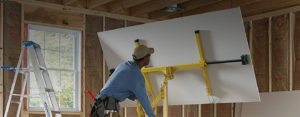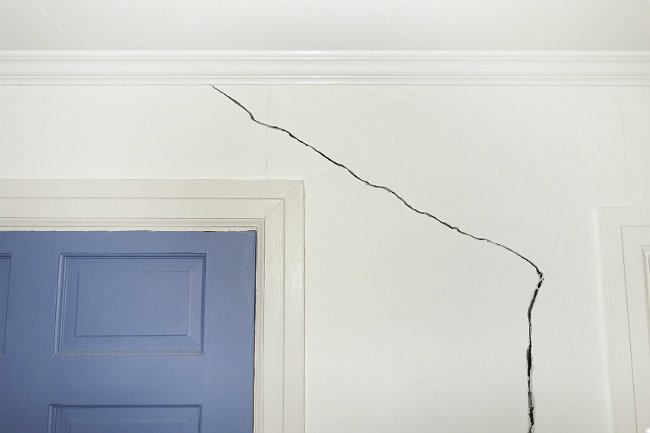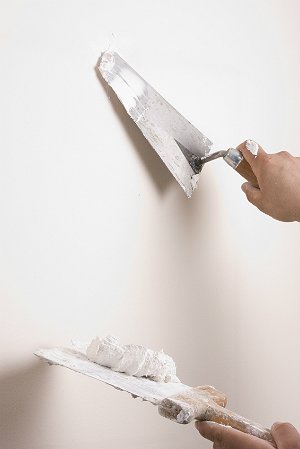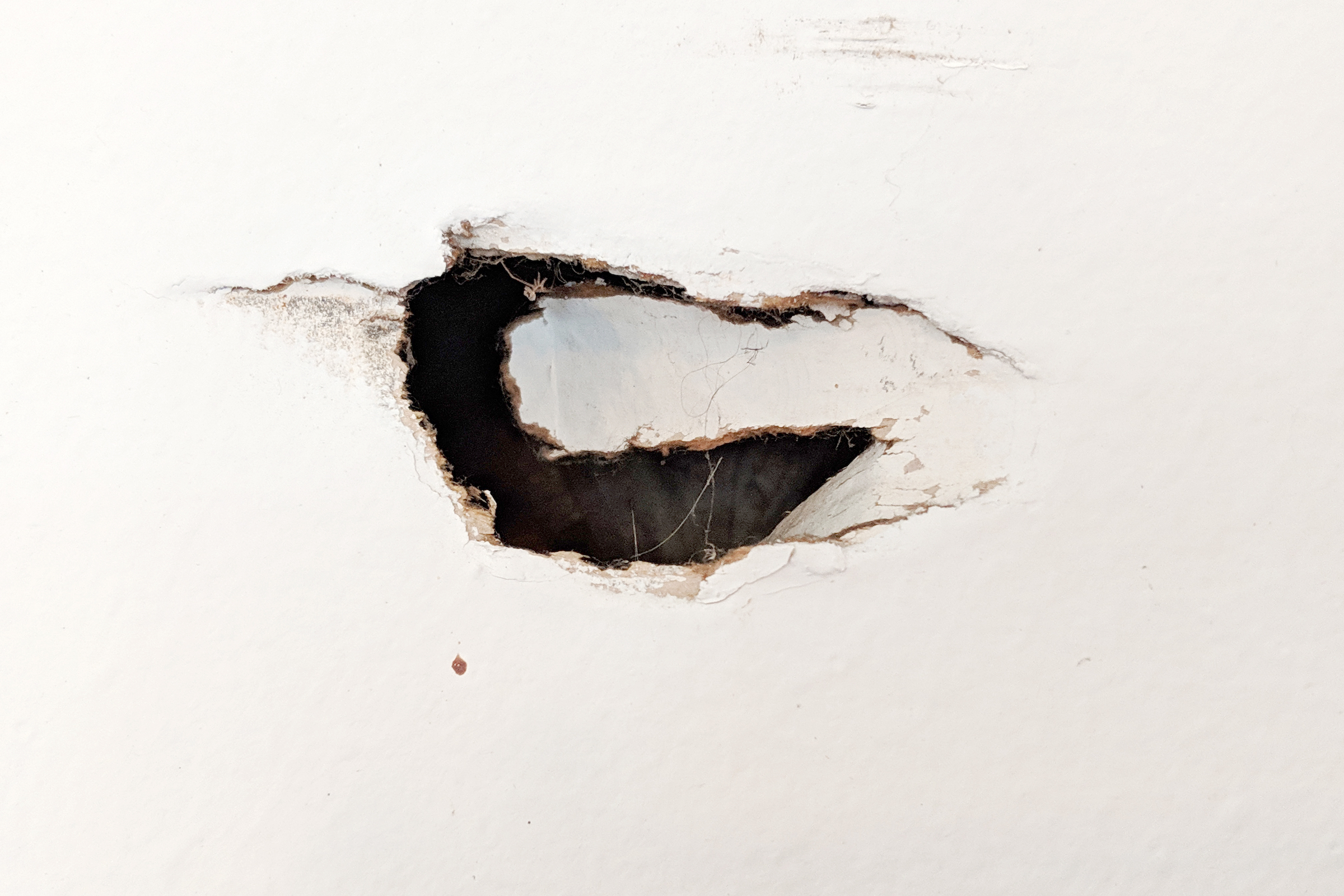HOW TO REPAIR A HOLE IN DRYWALL
Drywall repair is a common home maintenance task that many homeowners can do themselves. The skill set, tools and techniques required for drywall repair depend on the size of the hole. If you can flip a fried egg, you can easily patch a small nick in your drywall, but it gets trickier as the holes get bigger. But don’t worry; Mr. Handyman is here to help! Download our Drywall Repair Guide for step-by-step instructions.
Drywall Repair Techniques
The size of the hole will determine what method of repair you’ll use. You may not need all of these tools – before you purchase anything, reference the guidelines below to see what you’ll need. You’ll find the required materials listed with each step. Drywall tape is available in paper or mesh, select mesh if you have a choice. The tools in bold are required for each step, regardless of hole size.
HOW TO PATCH A SMALL HOLE (ANYTHING SMALLER THAN A NICKEL)
Small holes in drywall are simple to fix. Any hole larger than a nickel should be repaired with the instructions under Medium or Large hole. Use spackle or joint compound to fill the hole. If you’re using joint compound, buy it pre-mixed for small DIY jobs. Spackle may shrink as it dries in larger holes and may require an extra application. Joint compound may run out or bulge as it sets and will require sanding and a second application.
HOW TO PATCH A MEDIUM HOLE (ANYTHING SMALLER THAN SIX INCHES)
For a professional finish follow the instructions under Large hole. This method requires finesse to feather the joint compound into the rest of the wall – if not done correctly, you will see a slight bulge in the wall. You must feather the repair area (gradually reduce the thickness outward) when applying the joint compound and in the sanding stage. Use a drywall patch that is slightly larger than the hole that needs to be repaired. You can purchase these at your local hardware store. Look for a kit, which will include everything you need.
HOW TO PATCH A LARGE HOLE (ANYTHING LARGER THAN SIX INCHES)
Take your time, and be careful not to nick any wires or plumbing during installation. Although this method requires more tools, the final result is more professional looking.

Tips for Hiring a Professional Drywall Contractor
The place called home must be truly made and designed to provide the deserved welcome any visitor and home owner desires when entering into the house. This and many other reasons was responsible for home design and decorations many years ago. One of the ways to design the wall or ceiling of a building is the installation of drywall which is usually very difficult and laborious work. Drywall installation involves a good knowledge of the techniques to ensure and guarantee a good outcome. The cutting, shaping and putting the panel into place and fastening as part of the sheetrock process does not give room for unprofessional practices which can mar and destroy the whole of the work while the plastering and sanding to ensure wall smoothness and elegance also require a high level of expertise and experience. Thus, installing drywall requires you find a professional installer for quality and reputable service. If you want a home renovation or improvement done or you need a residential drywall repair specialist. If you intend to install drywall for a new home or office, finding a professional installer may be difficult. However, below are some very useful tips to help find professional and reliable drywall installation contractor easily
Find a List of Contractors
Finding the perfect drywall contract for your residential drywall repair or for drywall installation for new homes or offices starts with you finding a list of drywall contractors within and around your location. You can go online, visit home building stores or just through word-of-mouth from friends and colleagues. Be sure the contractors you find offer the service you need. Once you have a good list of commercial drywall contractors, you then need to vet them.
Interview Contractors
Now that you have compiled a list of commercial drywall contractors, you have to be sure you are hiring the best out of many and doing this requires you set up an interview for them. Place a call to each of the drywall contractors and ask very good questions. If you find it hard to do this, ask these questions; ask about the company and years of service, all the services they offer, ask about how the company will finish the job if eventually hired, ask of time to complete the job and many other very important questions.
Licensing and Insurance
The drywall installation contractor must possess every necessary documents from government agencies and establishments that offer license and authorization. You must be sure that the installation company is duly registered, authorized and licensed to work. You should also be sure that the company is insured so that they can pay if any damage occurs during installation. Check the documents physically to be very sure.
Get References and Reviews
Reference and Reviews always help to avoid scams and stay safe when hiring a professional drywall installer as commercial drywall contractor for your residential drywall repair at home or in the office. Ask about reviews from neighbors, friends and colleagues. You can also get some reviews on their website.

Dos and Don’ts of Repairing Drywall
Drywall is tough, but it’s not indestructible. Over time, gypsum-board walls can sustain ugly cracks or holes. Fortunately, drywall is fairly easy to repair, but there is an art to it. Here’s what to do—and what to avoid—when fixing drywall damage so it’s indiscernible to landlords, homebuyers, or visitors.
DO use the right stuff.
When repairing minor scratches or dents smaller than ½ inch across, fill them with a thin layer of joint compound (also known as drywall mud). Apply using a 3- to 4-inch putty knife made for drywall work—rather than, say, the kind of narrow utility knife you’d use for wood putty—smoothing the filler till it’s flush with the wall. Cracks or holes larger than ½ inch require reinforcing mesh prior to spackling. If you apply joint compound directly to large gouges, the damage will reappear as the house settles and the joint compound dries and crumbles.
DON’T waste time.
Avail yourself of pre-made products designed to simplify repair tasks. Patch kits with reinforced center panels and self-adhesive tape work great for smaller holes. A drywall compound and primer combo (such as 3M Patch Plus Primer, available on Amazon) leaves a surface that’s ready to paint
DO remember neatness counts.
Use a box cutter or other sharp blade to cut random strands of mesh tape or frayed edges of wallboard paper around holes or cracks before applying joint compound. Otherwise your finished work will show bumps and other blemishes
DON’T cut the cords.
Be safe and don’t cut into a wall to repair a hole until you verify that electrical cords and plumbing lines aren’t running through the cabinet behind it. If the hole is just a few inches wide, shine a flashlight into it to see what’s there. If you must enlarge the hole, carefully cut horizontally with a drywall saw—but avoid going deeper than an inch. It’s safe to assume that hot wires will be present near an electrical outlet, but don’t bet your life—or life savings—that homebuilders or renovators followed all electrical and plumbing codes. Wires and pipes are often found where they don’t belong.

Drywall Repair Cost: What Is a Fair Price for Your Project?
Drywall is used in 96 percent of homes today, so there’s a pretty good chance your walls and ceilings are made of this highly popular material. Unfortunately, it’s quite susceptible to damage, so no matter how careful you are, there’s a good chance you’ll encounter some bumps and dents that will need to be repaired, especially if you’ve got kids and pets.
While the thought of doing drywall repairs yourself may seem daunting, handling minor damage can be fairly inexpensive and can generally be done in a couple of hours. More complicated repairs done by a handyman or contractor will be more expensive due to the labor-intensive nature of the job but can yield excellent results.
So, how can you decide who should do the job and if the drywall repair cost is fair? We’ve put together a guide to help you understand all the ins and outs of drywall repair costs, when you can DIY vs. hiring a pro, and how to find a good professional when you need one.
Average Cost of Drywall Repair
So how much does drywall repair cost? The answer is dependent on the severity of the damage, accessibility and who does the work.
Drywall Repairs You Can Do Yourself
If you’re handy, you should be able to tackle small holes, nail pops, chips, and stress cracks (less than 6-inches across) and it will only cost between $10 and $30 for basic supplies like drywall mud, sandpaper, and touch-up paint. A handyman can handle these types of repairs within a couple hours and it will cost you between $60 and $180

Top Drywall Repair Companies Near Your Area
Ask About Licensing and Insurance
Depending on your location, a business license could be the only thing required for drywall repair. Find out which licensing procedures are required in your area, and then make sure that prospective drywall repair contractors are properly licensed. The right contractors will also be properly insured, and they will happily provide proof of insurance when asked.
Make Sure to Get a Written Contract
Whether your drywall repair project is big or small, a written contract is something that you can’t do without. If your prospective drywall repair company prepares the contract themselves, make sure that you read it thoroughly to ensure that all of the points are satisfactory. If there are any issues with the contract, don’t be shy to ask for revisions
Follow the Rule of Three
Before you start with contracts, get three estimates from different pros to compare local prices for this service.
Ask About the Tools They Use
Ask for a rundown of the repair process from start to finish including information about the tools that your drywall repair contractors will use. It’s also important to make sure that your contractors will clean up their own mess.